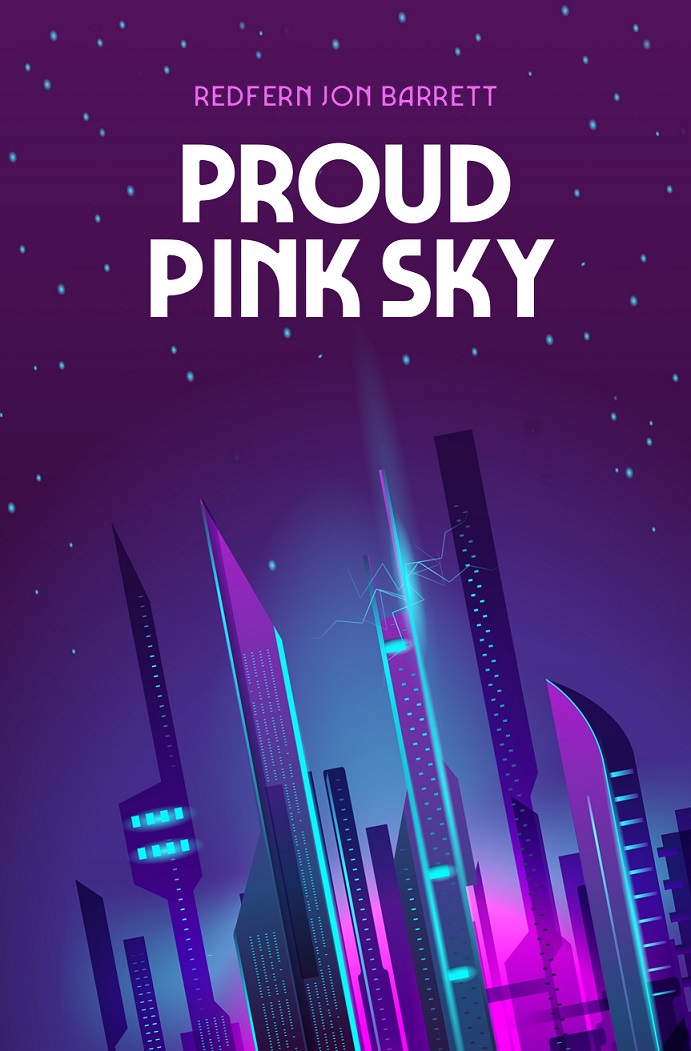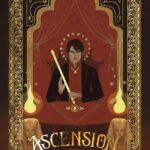
Genres: Queer Protagonists, Speculative Fiction
Representation: M/M, nonbinary and trans rep, minor polyamory, background gay and lesbian
PoV: Third-person, past-tense, multiple PoVs
Published on: 14th March 2023
ISBN: B0BFJQJRQL
Goodreads

Berlin: a megacity of 24 million people, is the world’s first gay state. Its distant radio broadcasts are a lifeline for teenager William, so when his love affair with Gareth is discovered the two flee toward sanctuary. But is there a place for them in a city divided into districts for young twinks, trendy bears, and rich alpha gays?
Meanwhile, young mother Cissie loves Berlin’s towering highrises and chaotic multiculturalism, yet she’s never left her heterosexual district – not until she and her family are trapped in a queer riot. With her husband Howard plunging into religious paranoia, she discovers a walled-off slum of perpetual twilight, home to the city’s forbidden trans residents.
As William and Cissie dive deeper into a bustling world of pride parades, polyamorous trysts, and even an official gay language, they discover that all is not well in the gay state – each playing their part in a looming civil war...
I received this book for free from the author in exchange for an honest review. This does not affect my opinion of the book or the content of my review.
Highlights
~twinks have their own city district
~so do Daddies
~Cissie is not a sissy but is she cis???
I’m not sure what I think of Proud Pink Sky. I was so excited by the premise – especially when the author assured me that trans and nonbinary people played a central role! – that it was one of my most anticipated releases of 2023.
Now I’ve finished it, I feel a little…underwhelmed?
Proud Pink Sky is an alternate-history novel where Berlin became the world’s first ‘gay state’ in the aftermath of WW2, due in large part to the role the queer community played in resisting the Nazis. (In fact, in this timeline, the Nazis were kicked out of Berlin before the start of the war by the ‘gay brigades’ who had zero time for fascists.) This has in no way endeared or even normalised queerness to the rest of the world, unfortunately, and Berlin sees a huge number of gay and lesbian refugees and immigrants for this reason.
The story takes place over about a year – starting in 1998 and wrapping up in 1999 – and follows three main characters: William and Gareth, teenagers who escape to Berlin from England after their relationship is discovered; and Cissie, a homemaker who moves to Berlin from Ohio with her husband and children because the ‘gay city’ has plenty of great job opportunities, even for ‘breeders’ – although they’re expected to keep themselves to themselves in the hetero district of the city.
(And yes, I laughed at Cissie’s very on-the-nose name. I AM IMMATURE AND EASILY AMUSED.)
Barrett has done an enormous amount of worldbuilding, with this alternate-Berlin’s history mirroring or echoing our real world in some very interesting ways. Despite what you might expect, Berlin is not a glorious, free-for-all queer utopia (alas); instead it’s an incredibly rigid, unforgiving culture obsessed with sticking its citizens in the ‘right’ categories, categories which are even reflected in the city’s geography (as each approved subculture or label is given their own district). Bisexuality is legal, but viewed with immense suspicion, and it’s not safe for m/f couples to be in public as couples (we see one such couple assaulted, harassed, and eventually driven from the bar where Gareth works). Monogamy is mandatory; refugees and immigrants don’t receive full citizenship unless they’re married to someone of their own sex, lest ‘secret straights’ flood Berlin by lying about their sexual orientation. (Why anyone thinks this is a thing, when the rest of the world is still homophobic as fuck, is…well, once upon a time I would have called it poor worldbuilding, but being a bit older and wiser and more cynical, I now don’t find it hard to believe. It makes no sense, but then, bigots panicking about immigration never do.)
The list goes on, but a clear focus of Proud Pink Sky is the trans and nonbinary community. Despite acknowledging that it was trans people who kickstarted the riots that drove out the Nazis (echoing our world’s Stonewall) and the fact that, pre-Nazis, Berlin was the site of the first sex-change operation in the world, in this alt-Berlin it is illegal to be anything but cis. (It’s also illegal to be polyamorous, because of course it is.) Anyone who doesn’t fit inside the binary is cast out to the slums, which are enclosed in an 8km wall (significantly shorter than our world’s Berlin Wall, but an obvious nod to it). To be trans and/or nonbinary is to be considered a pervert at best and a member of a queer terrorist group at worst.
And what little plot exists here revolves around Remould, the aforementioned walled-in neighbourhood. Cissie makes her way there by accident, and gradually begins to form relationships with the people there and find meaningful work for herself (not that taking care of a home and children aren’t meaningful, but at least to Cissie they seem meaningful in a different way). William, uneasily aware that he doesn’t fit neatly into Berlin any more than he did back in England, grows increasingly sympathetic towards and drawn to everyone who doesn’t fit neatly into their assigned boxes. Minor spoiler under the cut: View Spoiler » Gareth, eager to embrace all that Berlin is, doesn’t understand William’s reticence, and friction ensues.
That’s…kind of it.
Proud Pink Sky is, honestly, mortally dull. Nothing really happens. Until the very sudden, massively confusing ending, which I think was an attempt to give the book a hopeful ending, but, uh…no. No. That’s not how human beings work. That’s not how people respond to That. That’s not how communities react to That. That? Is not any kind of magic wand that suddenly makes people less bigoted or less afraid. What even.
Possibly this book would hit quite differently if I…didn’t already take it as read that bi/pan, trans, nonbinary, and polyamorous people absolutely belong in the queer community? (As do all those on the ace spectrum, though there’s no mention of them in Proud Pink Sky. Which I can forgive, because this is set in 1998 and the term ‘asexual’ wasn’t in common parlance yet.) If I didn’t already think strict rules about labels, or obsessions with categorising everyone, is fucking stupid? If I wasn’t already aware of the prejudice and struggles bi and trans and poly (and ace) people face within the queer community? If I didn’t already massively disapprove of gatekeeping?
I guess I’m just not really sure who this book is for, or what I’m meant to take away from it. Because it wasn’t entertaining, wasn’t a fun read, but at the same time I’m not sure how great a job it did at…humanising/explaining/showcasing binary-defying queer people. You know? If I handed this book to a TERF, it would not make them question their bigotry. If I handed it to a cishet person who really doesn’t know much about trans or nonbinary people, I don’t think Proud Pink Sky would leave them with a clear understanding, or even answer most of their basic questions.
It’s an Issues book that…doesn’t actually dig into the issues. It’s a homemaker making friends, and two young gay men having to face the fact that Berlin is not the perfect escape they dreamed it would be. Through conversations and glimpses, we are sneakily shown that Berlin is a mass of hypocrisy, in a reveal that was not shocking in the least. And cishet white men continue to be pathetic and awful when they feel their masculinity is challenged. Also not exactly revelatory.
I think it says a lot when the Timeline of Berlin at the back of the book is vastly more interesting than the story itself. I loved those short paragraphs on queers driving out the Nazis, learning how differently WW2 went down in this timeline (Germany developed the nuclear bomb first and dropped one on London, which is never even mentioned in the novel!), and getting a tiny glimpse of the formation of Berlin’s two parliaments (one all-men, and one all-women). The excerpts from the fictional Honest Guide to Berlin, which break up the different Parts of the book, were also great; learning how differently the AIDS epidemic (renamed DISS, Disrupted Immune System Syndrome, in this alt-verse) hit a world with a gay state was awesome, and the passing mentions of queer terrorists, while alarming, also had me rabidly curious.
But Proud Pink Sky doesn’t, itself, touch on any of that. Which seems like such a missed opportunity. This could have been a novel about the formation of the world’s first gay state, for example – or if it really had to be set in 1998, why not have us follow a queer terrorist group? That could have turned into the (eternal) question of when, if ever, it’s acceptable to use violence to claim your rights; it could have been thought-provoking and exciting. You could entwine it with other characters campaigning with non-violent means. You could bring in international politics. You could make it into a book I don’t want to put down.
Instead, this was a book I had a hard time finishing. I was just so bored. None of the characters felt fully fleshed-out, and none of them were interesting, and none of them got up to anything interesting. The prose is very plain and simple; it’s not beautiful or moreish, just extremely basic. Proud Pink Sky illustrates real-world problems that exist within the real-world queer community – biphobia, transphobia, the obsession with labels, an insistence that if we can just be Good Enough Gays the rest of the world will leave us alone – but only in a pointing-them-out way, rather than doing anything with them.
I love worldbuilding, and I have no problem coming up with lands or worlds – will happily spend months on totally trivial details – but I’m pretty awful at thinking up stories to set in them. And it feels like that was the case here: tons of thought and work went into a genuinely interesting alternate Berlin…but there’s barely a story here – not even one that reads as an excuse to show off the setting – and what there is was very good for my insomnia.
It’s not bad, I guess. But it is most extremely meh.







Leave a Reply